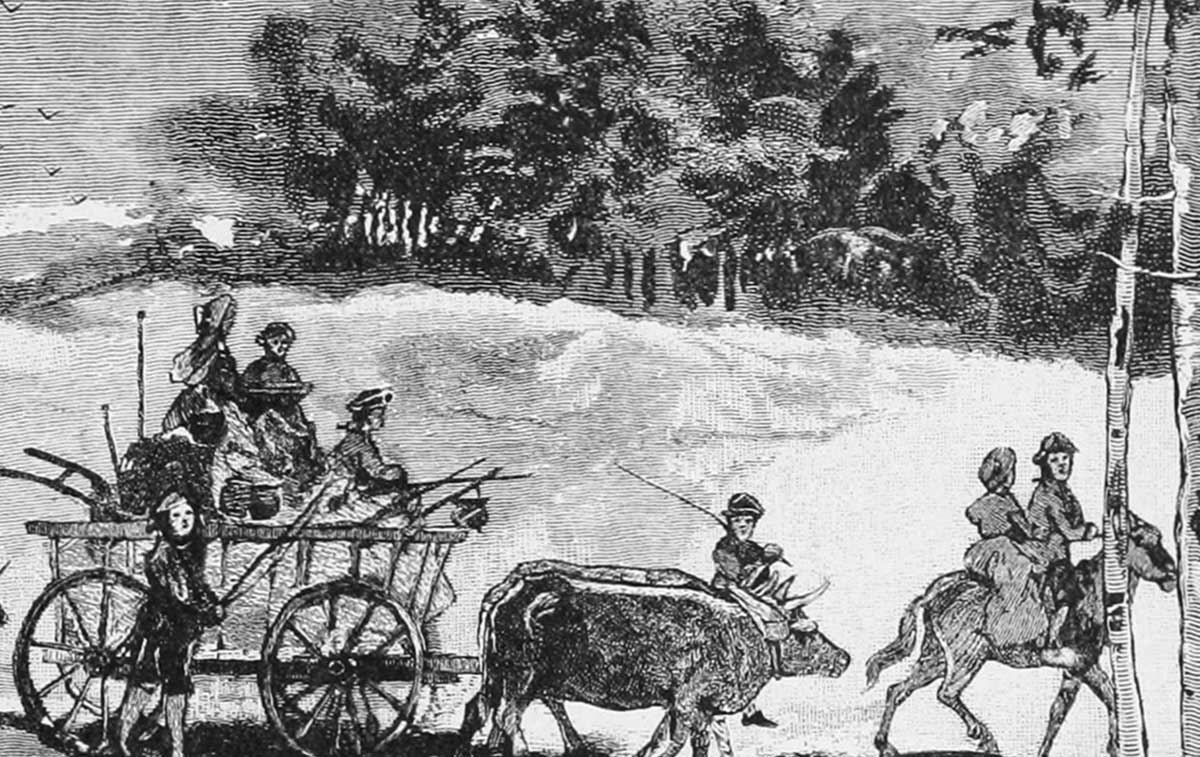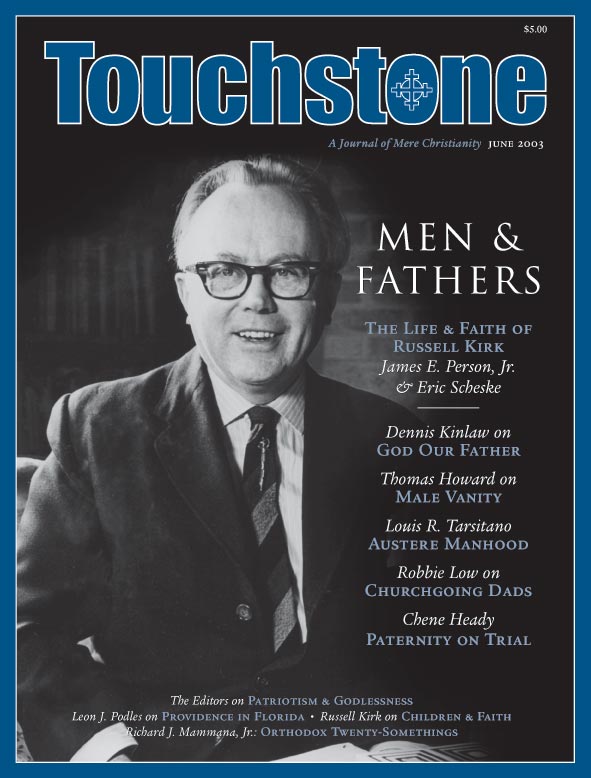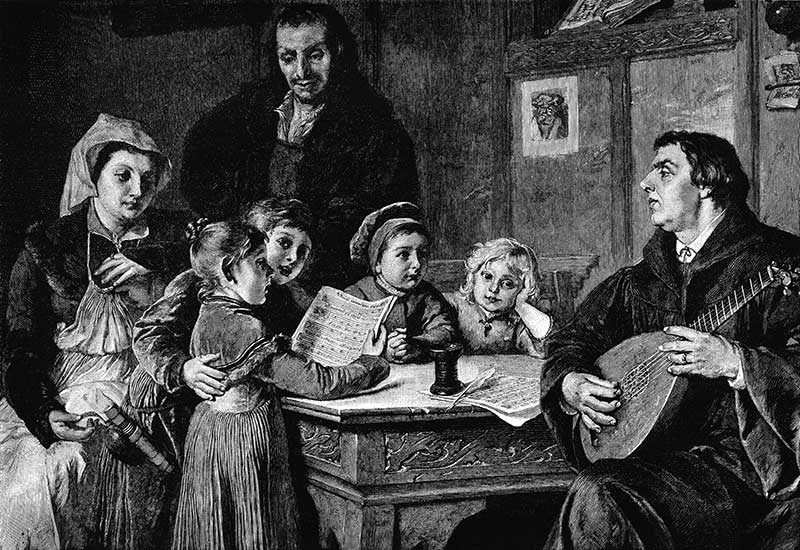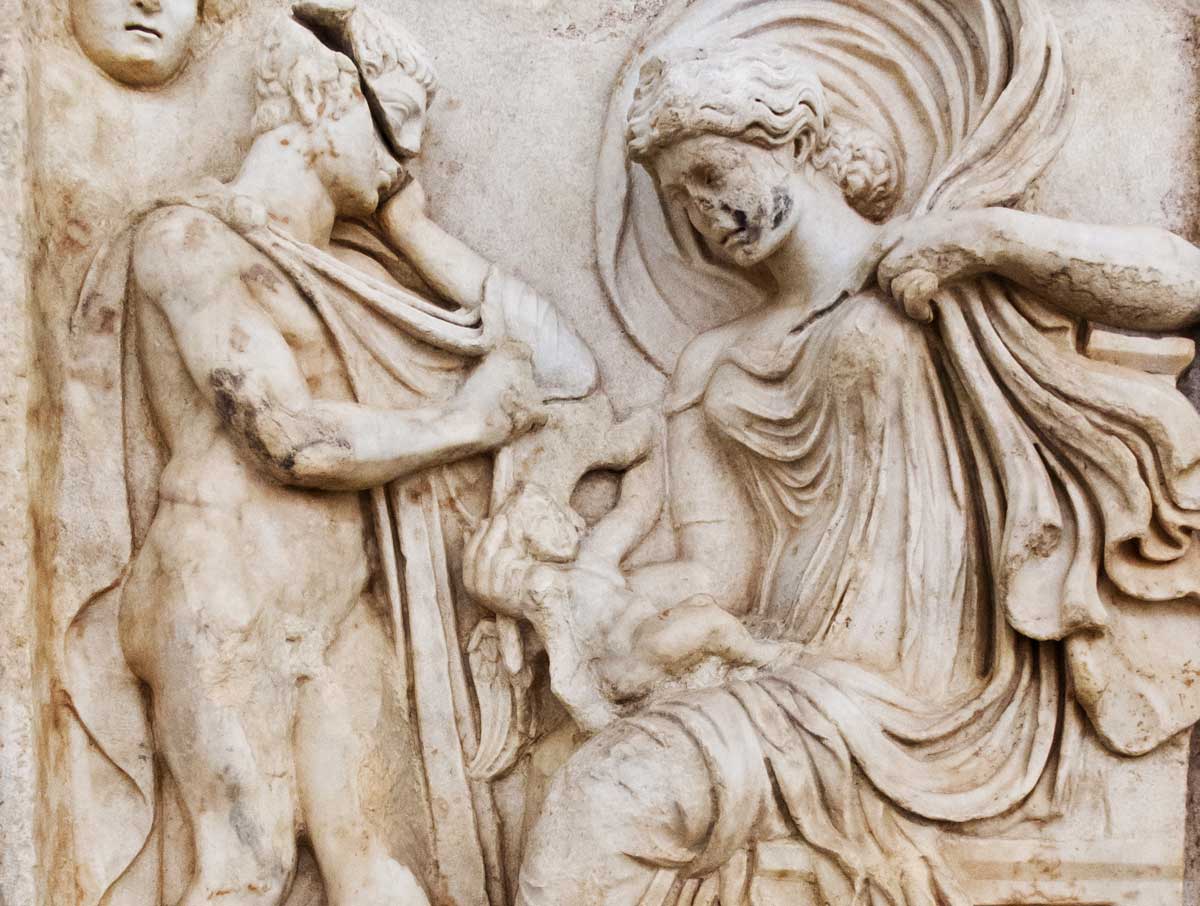Sacred Pedagogy
How & What We Learn About God from the Family
by Dennis F. Kinlaw
One of the wonderful things about our Father’s world is that, no matter how black the horizon or how frightening the evil forces of social disintegration that appear to be destroying all around us that is good, if one looks closely enough, one always can find signals of hope somewhere. A Good Friday and a Black Saturday are never the last word in God’s story for us.
We must remember that even on that day when the Sun hid its face in shame before what appeared to be the ultimate victory of all evil, that day had within it the best of all promises—though not everyone could see it. History remembers that Friday as Good. The reason: Our Father, who is the first and last Word in every event, will not leave himself without a witness, and that witness is one of hope. There is always Good News to be found somewhere in his world if we will just look. We may need to search a bit because the divine hand often is found at work in the most unexpected places.
The First Father
As one looks across the centuries at Christian thought, it appears there has been more attention paid by more people to the doctrine of the Trinity in the last 75 years than at any time since the first four centuries of the Church. The discussion that has transpired, to my mind, has within it potential help for us that could have remarkable, perhaps even radically benevolent, effects. It can help us understand more clearly the nature of the family and of the human personhood that the family assumes. It enables us to see in a fresh way, first, the ultimate basis for the family, and second, God’s purposes for it.
First, the doctrine of the Trinity takes the origin of the family out of the domain of the social scientists and the biologists. We do not have to look to either the natural or the social sciences to understand the mystery of this social institution. When we understand something of the Christian doctrine of the Trinity, we find that the basis for the family rests, not in the creation, not in us, but in the very being of God himself. The reality that we call “fatherhood” has its origin before time began because the first father was not Adam. It was the first person of the blessed Trinity.
If you will let me use the language of time to speak of the eternal, long before God was ever called God, Lord, Sovereign or any other appellative that speaks of his attributes, he was called Father by his Son, the second person of the Trinity. This means that the first word that has to be said about God is not a word of sovereign power or dominion, but one that comes from the family; not a word from the court, but one from the hearth.
Furthermore, Paul even suggests that the final word will not be one of sovereignty or from the language of the court. In 1 Corinthians 15, Paul portrays the scene where the last enemy, death itself, has been destroyed and every knee has been bent in acknowledgment that Jesus is Lord. All things are finally under his nail-scarred feet. Note Paul’s words as he describes the end of the human story in this world: “Then cometh the end, when he (Christ) shall have delivered up the kingdom to God, even the Father. . . .”
The fact of fatherhood is an eternal one. Before the creation, God was Father, and at the end of creation, he will be Father still. Do not worry—no matter what you hear on the evening network news, in the newspapers, or in the scholarly journals, the final word on human existence will be a familial one. The real key to the understanding of the institution of family is not to be found in our sciences. It is found only in Christian dogma.
The fact that people come in families is clearly an aspect of what it means for us to be made in the image of God. Every person we have ever met, or will ever meet, has parents. When you see one, you know that there are, or were, two more, and if you find the two, you know that there are, or were, four more. No matter what the scientists think up next, that fact undoubtedly will continue to characterize human life.
Further, the most natural first word for any child will continue to be the one for either his mother or his father. The first of all personal relationships is, or should be, with parents. There are physical realities in this scene that have social import, but there also are sacred realities. To miss the sanctities can turn any society into a Sodom or a Gomorrah. In our own culture, unfortunately, we are watching just that.
The world that we can see is indelibly marked by the familial and, from God’s perspective, for the most benevolent of all purposes. How better could our Father, whom we cannot see, help us to understand that the doorway into that world beyond our senses, that other world with which we all must ultimately deal, that door actually opens to us with the simple words: “Our Father who art in heaven. . . .” The family has roots that our culture cannot see and that the social sciences have no instruments to trace, roots that reach beyond time into the ultimate nature of the eternal reality that we call God.
The Object Lesson
If the basis for the family is in the very being of the deity itself, what were God’s purposes for putting us in families?
A first thought for the average person probably will be that the family was his chosen vehicle for the propagation, the perpetuation of the race (or should we say “family”?). To say that God could not have found another way to do that is well beyond my ken. For me, I am grateful that he chose to do it this particular way. As a father of five, grandfather of 16, great-grandfather of seven, and a spouse of 58-plus years, I like the plan that he chose.
As the years have passed, as I have observed societal and family relationships and as I have tried to live with and understand the biblical text, some convictions about God and the family have deepened within me. As for God himself, the family has convinced me that God is the prototype of all good third-grade schoolteachers. He is the originator and the master of that pedagogical device so popular with them, the object lesson. God teaches by signs, and the family is the primary, the most foundational of all his signs. Before the child has ever gone to school, the little one already has found himself in the school of all schools, the one that is most crucial for the learning of those lessons that determine the difference between life that is good and life that is not.
Lest you conclude that I am thinking here primarily of moral and ethical instructions that help shape the children’s views of right and wrong, and that we hope will determine their conduct, let me say that I want to go much deeper than that. The really profound intellectual questions, contrary to what we commonly think, do not wait for college or graduate school. They unwittingly are raised and often answered in the depths of one’s own psyche long before that.
In fact, the answer to the question whether one is to be an idolater, a worshipper of a god of his own projection, or whether one is able to think about the true nature of God himself and to worship the One who is the great “I AM,” may be determined for most folks long before they ever leave the environs of their own homes.
Take, for instance, the question of the relationship between justice and mercy. If one cannot rightly relate these two concepts, one necessarily will be a worshipper of a false god no matter what he may call him.
Are these antithetical concepts, or are they actually different expressions of a single reality, that profound concern for another’s well being that the Scriptures identify as holy love? In school, these can only be discussed as abstractions. In the family, they can be existentially displayed in incarnate life.
What will one do to explain Good Friday and the crucifixion if he cannot conceive of One who is both merciful and at the same time just, whose mercy and justice proceed from a single source, God’s own nature of holy love? Only if one can think such thoughts can one ever understand the affirmation of the psalmist: “Mercy and truth are met together; righteousness and peace have kissed each other” (Psalm 85:10).
My question is whether such thoughts will even be thinkable for the person who has never seen them expressed in the flesh. My conclusion is that God gave us the family so that it is possible to think of him, so that all who have a father can have some basis for being able to think of the Father. And if one cannot think of God, then one is destined to live in delusion with all of its inevitable nugatory consequences. Being able to think of God is the key to understanding the nature of reality—our own, the ultimate, and all else.
William Temple understood this. He insisted that if one’s concept of God is wrong, then the more religion he gets, the more dangerous he is to himself and to others. Our current evening newscasts provide ample data to confirm the accuracy of Temple’s conclusion.
The family is the key to getting at the right concept of God. If the family is wrong, the possibility of thinking of the true God is a problem. But if the family is right, the child—blessed by being brought up in it—is in a far stronger position to be able to grasp and make his own the deeper truths of the Christian faith.
My Father’s Purpose
I must personalize this a bit with a couple of stories that have helped determine my own intellectual journey.
It was my lot to grow up during Depression days. My father, a lawyer, raised most of our food in his garden. Money was exceedingly scarce. I could not join the Boy Scouts because the dues were a nickel a week and a uniform cost nine dollars.
One winter evening after supper, as the family sat around the stove to keep warm, my father took from his pocket six silver dollars that were in mint condition. I looked at those big shiny “cartwheels,” as we called them in those days, and found myself experiencing something for which I had no word in my child’s vocabulary. I found a soul-encompassing avarice flooding me.
When I asked if I could hold one, my father immediately placed one in my hand. I stared in delight. Then, I looked up at him and closed my hand over it. Still watching his face, I put my hand behind my back and took a step backward. My intent was quite obvious. He then put his empty hand forward and insisted that I give it back. I shook my head negatively and took another step backward.
I then received my first lecture on property rights. When he finished, I was delighted to return the coin to its real owner. It was too hot for me to handle.
The second story took place a decade or more later. I was in my senior year of undergraduate studies and was home for Christmas break. It was New Year’s Eve, and I was scheduled to leave the next day for school. My father sat down with me and gave me a $500 check. Then he asked, “Will this be enough to get you through your final two quarters for your A.B. degree so that you can graduate this coming June?” I assured him that it would be sufficient.
The next day, I returned for my last stint in college. It was six weeks later that I received the only telephone call that came to me in four years of college. (You see that I come from another age.) It was my mother. I was shocked to hear her say: “Honey, Dad is gone.”
I asked immediately how it happened. She said that she was wakened during the night. Dad was getting up. He often had trouble sleeping. His mind was too agile to permit him to lie awake in bed very long, so he would get up and read for a while. Usually, it was the Bible that he read. She woke up again, and he was back in bed and was quoting to himself Scripture verses that he was memorizing. Later, she was wakened again. He had called her. When she touched him, he was gone.
It was years before I would ever share with anyone the first thought that went through my head. I felt that it would seem too selfish, too self-centered. The predominant thought that for years embarrassed me was this: “Well, he has finished his work.” Somehow, I had come to believe that his purpose in life was to get me educated, and now, graduation was in view.
I was one of five children. Between 1929 and 1939, he financed 21 years of college for the five of us—and those, as I said, were Depression days. I never knew my father to borrow money until my junior year in college. It was against his principles, but he borrowed money then to keep me in school. I knew that my father placed a very high value on education and that he wanted the best for his own. In my mind, he lived to care for my needs. He lived for me.
Suddenly, that story of the silver dollar came to mind. Why would he refuse to give me one of his six shiny silver pieces? He was saving them, and the cost of membership in the Boy Scouts, for my siblings and for me so that we could be educated and fulfill the vocations for which God had placed us here.
Justice & Love Together
Now, what I am going to say might seem a long stretch for a secular-minded person, but it is not for me. I grew up, not only in Depression days, but also in the heyday of old-style modernism. When I was 16, as a Methodist in the South, in the “Bible Belt,” I never really expected to meet an educated person other than my own father who actually believed in the physical resurrection of Christ. Science, we were told, had made thoughts of such miracles unthinkable.
One of the two sermons preached for my ordinations to deacon and elder’s orders was a thoroughly Unitarian sermon on Jesus the man. It was preached by my bishop. Those were the days when we were told that the God of Moses in the Old Testament was a “bully god” and that one of Jesus’ prime purposes was to deliver us from the primitive and unworthy understanding of God reflected in Israel’s ancient literature.
In fact, we were taught that Jesus had come to explain to us that God is really quite nice and that we can call him “Father” because he loves us just as our earthly parents loved us. It was legitimate, therefore, to use the tender human title that we applied to our own fathers to God himself. Sinai and the Gospels, we were told, contained two very different pictures of God, but Jesus had brought us the nicer one, whom we could safely trust.
For a long time, I could not understand why that perspective never made sense to me. I found myself discovering aspects of grace and love in those Old Testament narratives that moved me deeply as I reflected on the amazing patience of God with a disobedient people. He gave them the law, but included within that law a way of forgiveness. No matter what they did, he did not appear to want to let them go. I seemed to see in the text insights that my peers could not see.
As I got older and finally admitted to myself my first thoughts on the death of my father, I finally understood. Deep within my spirit, I knew that justice and love did not have to be antinomies. I had seen them both incarnate in the same person. If they could be one in my own father, I knew they could be, and were, one in the Father of all fathers.
Do not tell me that the education around that stove in the family room of my childhood has not been of infinite value to me when dealing with questions of anthropology, Christology, soteriology, or just the nature of God. My question is: Will you think it if you have never seen it?
God has given me some rare academic opportunities in my lifetime. It was my privilege to read Pascal with Emile Cailliet, the New Testament with Otto Piper, John Calvin with Georges Barrois at Princeton, Plato with Robert Cushman at Duke, Paul with James Stewart at Edinburgh, and Bible and the literature of the ancient Near East with Cyrus Gordon at Brandeis.
But the keys to the profoundest thoughts that ever crossed my mind were made possible by the learning that unconsciously took place in my home. Because of that, if I were to list my greatest teachers, I would have to include Wade and Sally Burney Kinlaw. They ran a school where you could not only think great thoughts, but also see them incarnate.
Is this why the historic understanding of the public school system in the West has been in loco parentis? Apparently, from God’s perspective, no other instrument can do what needs to be done for a child as well as the family can do it. So he continues to put children in families, whether the family is one of his designing or not. It seems clear that he has no other option in mind.
Converting Words
No one of us is able to read God’s mind except where he has chosen to reveal to us his thoughts. At times, though, I have suspected he knew the problem that he was going to have in a fallen world in his communication with us, and that he planned the family as his prime aid in this concern.
Take, for instance, the problem of vocabulary. Where was he to find the words that would convey his nature and his truth? Our language is the language of time, not eternity. And it is the language of nature, not grace. Human words speak of human realities, not divine ones, but our languages are the only ones we know. We have had no chance yet to learn the language of heaven. So if God is to speak to us, he has to speak in our terms whether the words mean what he means or not.
There is a linguistic counterpart to the old anthropological saw that “Two people doing the same thing may not be doing the same thing.” It is simply: “Two people saying the same words may not be saying the same thing.” Words have had to be “converted,” as well as people. It may be that the most significant story in the history of God and his people, apart from God’s revelation of himself in the Exodus and in Christ’s Passion, is that of the development of the vocabulary necessary to convey the Word of God.
Take, for instance, the word holy. When God spoke to Moses, he had to speak Hebrew because that was Moses’ mother tongue. So, at the burning bush, God needed to tell Moses to remove his sandals because the ground on which Yahweh rested was holy because Yahweh, the Holy One, was there. So, he used a term from the language of the Canaanite religion for something separated to a god, something religious by definition. The noun for such is qodesh, and the masculine and feminine adjectives are qadesh and qedeshah, all from the same Semitic root qdsh.
The problem is that the feminine adjective was used to designate a female temple prostitute, and the masculine adjective was the term for a male prostitute (Deut. 23:18; 1 Kings 14:24, 22:46; 2 Kings 23:7; Hosea 4:14; et al.). The first occurrence of this Hebrew root in the Old Testament is in Genesis 2:3 where God hallows the seventh day, the Sabbath, a day set apart for God. The first time that it is used to describe a human person, though, is in Genesis 37, where the feminine adjective, qedeshah, is used to describe Tamar, whom Judah took for a sacred prostitute and used as such.
It is quite a linguistic journey from Genesis 37 to Leviticus 19:2, where Yahweh charges Israel to be holy because he is holy, or to Isaiah 6, where the cries of the seraphim identify Yahweh as the Thrice-Holy One. It has not been easy for God to make himself known for what he is in a fallen world, with its fallen ways and its fallen thoughts. Words, as we said, can be “converted” just as fallen people can.
The twin story to this one about the word holy is that of the “conversion” of the term love. It would be difficult to find a word in most of the languages of the world that would seem to need definition less than love. Who is there who does not understand this one?
I certainly was confident that I understood it when, at 19, I had come to know Elsie. Getting to know her changed my life. I found that when I was with her, I knew a remarkable happiness. In fact, the closer I could get to her, the happier I was. When I was separated from her, it was as if something essential to my well-being was gone.
So, I thought, “What if I could have her all the time?” That would be life itself. So, I told her that I wanted her to marry me, that I loved her. What I was calling love was acquisitive by definition. I longed to possess her. I wanted her for myself. My “love” was saturated with self-interest and, frankly, ego-centered. I would have been more factual if I had told her, “You make me happy. I like to be happy. Will you marry me so that I can be happy all the time?”
Converting Love
Later, I learned that I really did not know how intellectual I was in all of this. I read Plato’s Symposium, in which Socrates and his friends discuss the nature of love. Socrates himself gives the final word. Love arises, Socrates insists, out of need. It comes from the fact that to be human is to want to be happy, and a finite human’s complete happiness, his perfection, is never in himself. It always lies in something beyond the self, in something that the Greek would call the Good. So, when someone sees a Good, he is drawn to it and longs to possess it for his own happiness. That means, of course, as Socrates dutifully explains, that none of the Greek gods could ever love, because they are perfect and complete in themselves. They have no need of anything outside of themselves. Rightfully, they admire their own perfections and love themselves alone.
It was into this world, with this understanding of love and of the gods, that Paul, John, and the other writers of the New Testament came and wanted to share with their converts the nature of the God who had revealed himself in the death of his Son on the Cross. They wanted to say that Christ’s sacrifice of himself was not because of his need, but because of ours. What they wanted to describe was a relationship that was not determined by the attractive nature of the object loved, but by the nature of the One loving.
In fact, they wanted to describe the relationship that exists between the three persons of the Holy Trinity, where the Father gives his life to the Son, and the Son gives his life back to the Father, and where the Spirit lives to glorify the Father and the Son. And they called it love.
This was not, however, an acquisitive love marked by self-interest. Rather, this love was another-oriented, self-sacrificing love that would love the object in spite of the nature of the object being loved. This was a love where one would love one’s enemies—even if the enemies decided to destroy the One loving them. This was a love based on the nature of the Lover who was love itself, not on the nature of the lovableness of the one loved. In other words, they wanted to say that love is not just something God does. His love is other-oriented, and it is what he is. So John tells us: “God is love” (1 John 4:8,16).
That, of course, is unique among the gods of the world because Christianity alone has the concept of a God who is three persons in one being. Love is an interpersonal relationship. So where god is god alone, with no other within himself, such as Allah of Islam and the god of Judaism, god may love but in himself cannot be love. Since all human love in itself is self-oriented, there was no human term that in itself conveyed the other-oriented love that is the life of the triune God. This meant that, if God were to make himself really known to human beings, he must take a word that within itself did not carry the meaning he needed and fill it with completely new content. This God looks for sinners to convert, but he also has to look for words that can be filled with new meaning. The word agape was the result.
The verbal root from which the word agape came is almost unknown in classical Greek. It was so unfamiliar that it did not have the connotations that the familiar Greek terms for “love” (like eros) had. So Paul, John, and the other New Testament writers took this verbal root, which had never conveyed so radical a thought, linked it with new associations and poured a new content into it.
The result was a term that could convey a concept of love that was unknown to the world apart from the God who sent his Son to die for us. So, agape came to be the verbal symbol that was used to describe the relationship between the three persons of the Holy Trinity and into which God wants to draw his creatures. And Jesus came so that this divine life of love could be implanted in every human heart.
Now, how important is it for us to understand this? If one cannot think of this kind of God, one is not thinking of the God of whom Paul and John and the rest of the New Testament writers are speaking. Words are the instruments by which we think. Without the word, we will not think the thought.
Life & Love
But we also need to see such love, or a reasonable analogue to it. If we do not, we will never feel the need for a word to describe it. But where in human experience can one ever find a human analogue to such other-oriented, self-sacrificing love?
That is where the family comes in. It is God’s best pedagogical device to make it possible for us to see a love that in its freedom from the contamination of self-interest, at least in measure, points us to what is the very nature of God himself. The data here is so familiar to us, so much a part of natural life, that we tend to miss the theological overtones carried by these natural processes.
Procreation, childbirth, and the nurture and training of the child all carry remarkable overtones of agape. No person’s life is his own life. Existence itself always is a gift from two others, from the parents whose own relationship is assumed to be one of love. Conception itself takes place in a process that we call love. Then the fetus, for nine months, draws its life from the body of the mother. As the mother lives, the little person lives.
The separation of the fetus from the womb always is fraught with potential danger. Throughout the millennia and in the Third World today, where one does not enjoy the benefits of modern Western medicine, birth means that the mother goes through the very valley of the shadow of death to give life to her child. Then, for months to come, the infant continues to draw his life from the breasts of his mother. As she lives, the infant is enabled to live.
The child cannot support himself for several years to come, so the father is the means of support—first of all for the mother, that she and the child may live, and then later for the child, that he may grow and mature. In other words, two people live in love that another person may have life. Life and love go together. They belong to each other.
The processes of existence and life for a human person are the object lesson of all object lessons on the nature of life as the Creator intended it. These processes and relations also are God’s best analogue to help us understand the very nature and life of God. His is a familial existence where a Son is begotten by his Father and eternally draws his existence in an unbroken relationship from the Father himself.
The Son’s relationship to his Father is different from our relationship to our parents in that his umbilical cord has never been cut. We have an individuality in relationship to our parents that the eternal Son never knows from his Father. Jesus was very clear in his discussions in the Gospel of John about his continuing relationship with the Father. He insists that he has no life in himself. He draws his life eternally from the Father. He and the Father are two persons, but they are one indivisible Being, and their relationship to each other is one of love, agape, holy, self-giving love.
We, however, are single persons who, at the same time, are individual beings. We ultimately have a potential existence apart from our parents. We should not deceive ourselves, though. This is where the human family only images, is only analogous to the Divine Family. We all ultimately find an independence from our human parents, but the invisible reality is that we live in our Father’s world and draw our very existence from him through his gracious gifts. The food, the water, and the very oxygen by which we live all come ultimately from him. Even in our mature existence, we are no more able to live in and of ourselves alone than Jesus seems to have felt that he could live apart from the self-giving life and love of his Father.
The family of which we are a part by nature is not a replica of the Divine One. It is only like, only an analogue to the Divine Family into which God invites us all. Even so, it is enough like the Divine Family that it is without question God’s greatest gift to us—to help us think his thoughts, to know him as he is, and to know his purposes for us.
Good News
All of this brings us to one concluding word. There are many aspects of God’s Good News that bring comfort to us. For me, one of the most encouraging is its word about the family. The Census Bureau may no longer be able to define one. Our own government may be committed to trying to change its essential nature.
Yet, I have good news—and it comes from the highest authority. The family, as God designed it, is not going to go away. Its roots are too deep and its purposes too long-ranging. It is the Creator’s best instrument to let us know who he is. In fact, it is his divine gift to help us, if we will use it for its original purpose, to enable us, first, to think of him and, second, to know him personally. For before church or state, our Father established the family as his preferred doorway into his holy presence.
Yes, the family is here to stay. All praise to the Father, to the Son, and to the Holy Spirit for his wisdom, his mercy, and his love.
Dennis F. Kinlaw is the former president of Asbury College in Wilmore, Kentucky, and the founder of the Francis Asbury Society, which is committed to the spread of scriptural holiness via evangelism, retreats, and scholarly publications. A version of this essay was presented at the Association for Church Renewal conference in Indianapolis on October 24–26, 2002, and is included in the book, Confessing the Faith: Reclaiming Historic Faith and Teaching for the 21st Century, published by Reformation Press.
Dennis F. Kinlaw No Bio in Database
subscription options
Order
Print/Online Subscription

Get six issues (one year) of Touchstone PLUS full online access including pdf downloads for only $39.95. That's only $3.34 per month!
Order
Online Only
Subscription

Get a one-year full-access subscription to the Touchstone online archives for only $19.95. That's only $1.66 per month!
bulk subscriptions
Order Touchstone subscriptions in bulk and save $10 per sub! Each subscription includes 6 issues of Touchstone plus full online access to touchstonemag.com—including archives, videos, and pdf downloads of recent issues for only $29.95 each! Great for churches or study groups.
Transactions will be processed on a secure server.
more on family from the online archives

31.5—September/October 2018
Errands into the Moral Wilderness
Forms of Christian Family Witness & Renewal by Allan C. Carlson
more from the online archives
calling all readers
Please Donate
"There are magazines worth reading but few worth saving . . . Touchstone is just such a magazine."
—Alice von Hildebrand
"Here we do not concede one square millimeter of territory to falsehood, folly, contemporary sentimentality, or fashion. We speak the truth, and let God be our judge. . . . Touchstone is the one committedly Christian conservative journal."
—Anthony Esolen, Touchstone senior editor











